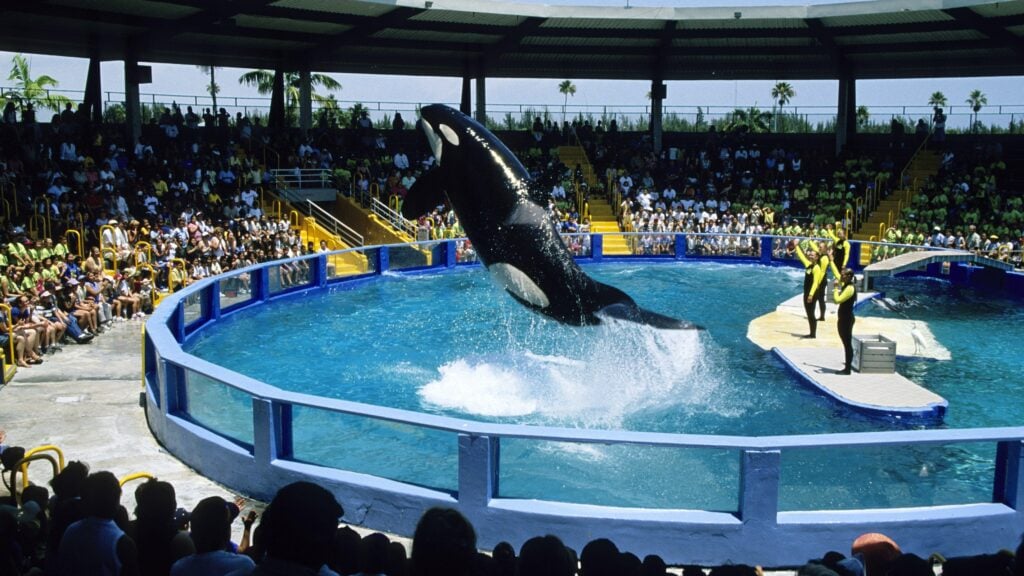Tokitae, a 56-year-old orca, could soon be released back to the Pacific Northwest waters where she was captured in 1970.
Miami Seaquarium, where she is still currently housed, has claimed to be fully onboard with the release, despite refusing such a move for years.
In a statement on December 13 2022, Eduardo Albor, CEO of the Dolphin Company, which owns the sea life attraction, said that he and his colleagues are all “100 percent committed” to returning her to her home.
Tokitae (also known by her stage name Lolita) cannot yet be transported to her release location of Puget Sound, off the northwestern coast of Washington, as she remains under medical care. It has been confirmed that she is suffering from a severe respiratory infection. This had led concerned activists to hope that she recovers in time for a safe release into her native waters so that she can live out her days in peace and freedom.
“We’re glad to hear that the Dolphin Company is still committed to moving Lolita after decades of being trapped in the smallest orca tank in the world, and suffering from a respiratory infection for which she remains medicated, and hope to see that happen as soon as possible for her sake,” Jared Goodman, vice president of PETA told the Miami New Times.
The campaign to free Lolita
Activists have been campaigning for Tokitae to be returned to the Pacific north-west to live out her final days for some time.
In a report published by the Guardian last August, it was even suggested that she could be reunited with her family.
Tokitae’s mother is still alive and thought to be in her 90s. Reports have claimed that she can still be seen leading a pod of killer whales in the Salish Sea in search of salmon.
Tokitae has performed in shows for 48 years, doing tricks like jumping, flipping, and lifting trainers in the air.
The campaign to release her has received worldwide support, including from activists, Indigenous groups, and philanthropists.
“We owe all these captive animals an opportunity to live in an environment as close to their natural environment as we can possibly provide,” said Charles Vinick, of the Whale Sanctuary Project, which helps free captive whales around the world.
Vinick also noted that whales like Tokitae have earned their human owners millions of dollars, adding: “We owe them a retirement program, a pension … giving them back something like this is the least we can do.”
What could happen to Tokitae?
A decision to release Tokitae could raise questions about her ability to survive in the wild after so long spent in captivity.
Howard Garrett, a whale researcher and activist who started working on plans for her release in 1995, thinks it’s possible she could be returned to the Pacific.
According to the report, he said that she could be safely transported on the 10-hour journey from Miami to somewhere in the San Juan Islands in a comfortable fleece-lined stretcher with cool water.
If it does go ahead, her release would be a rare case, as few whales have returned from the wild to captivity. But it is possible.
For example, Keiko – who played Willy in the Free Willy movies – was rehabilitated in a sea pen in Oregon in the 90s before living five more years in the wild in Iceland. He was much younger than Tokitae, however, at 22 years old.
Tokitae’s future
We don’t know whether Tokitae will be set free, but there is currently an operational plan to bring her back to a secure and protected area in the Salish Sea, where she could receive ongoing human care while being in her native waters.
If this were successful, she would likely require a great deal of space and food for the rest of her life.
It is also possible that she could end up at a 100-acre netted enclosure run by the Whale Sanctuary Project in Nova Scotia.
Concerns have been raised about her health, however, as well as the possibility that she could spread infections to other southern resident killer whales.
This article was updated on January 13, 2023, to include the statement from Eduardo Albor.







